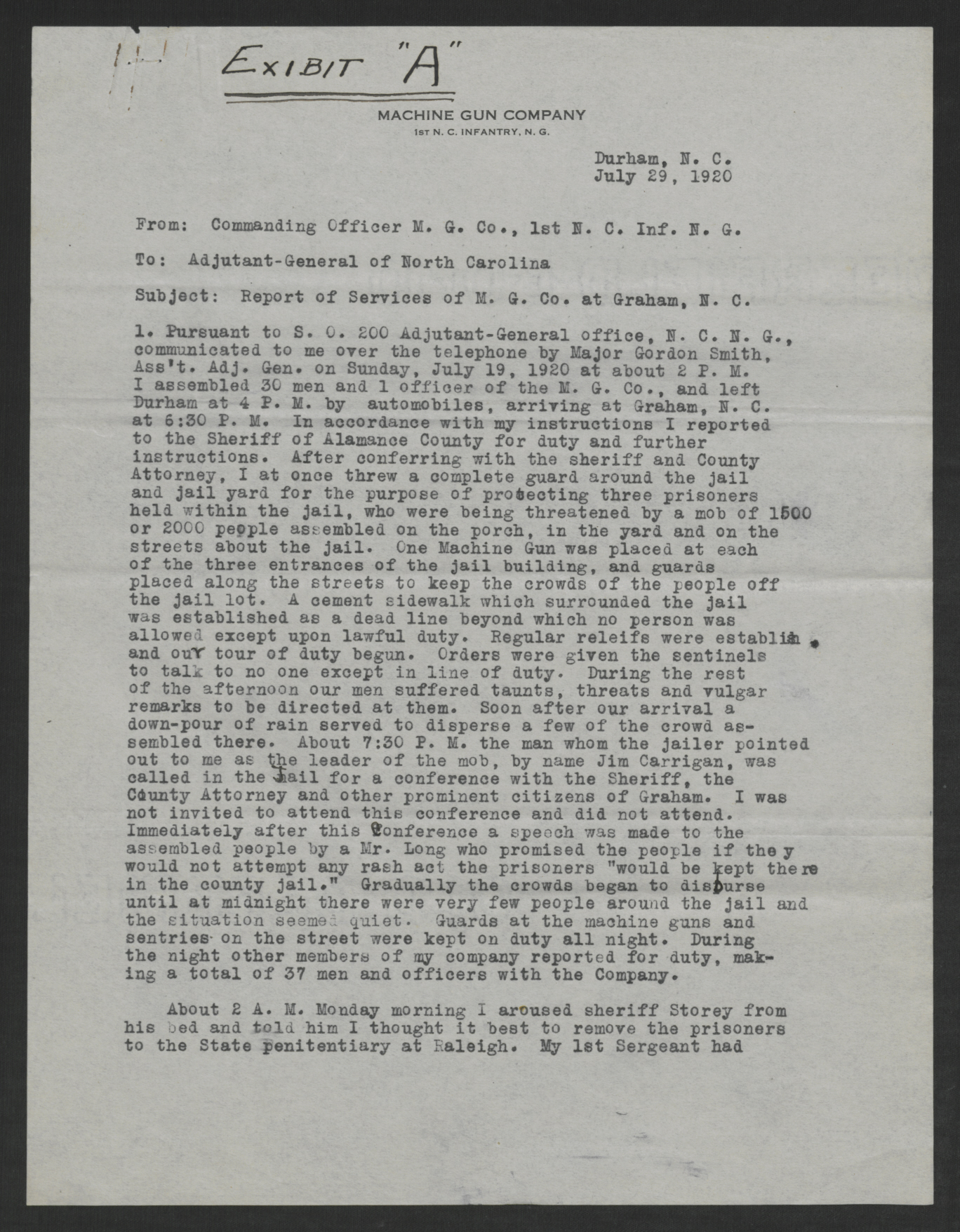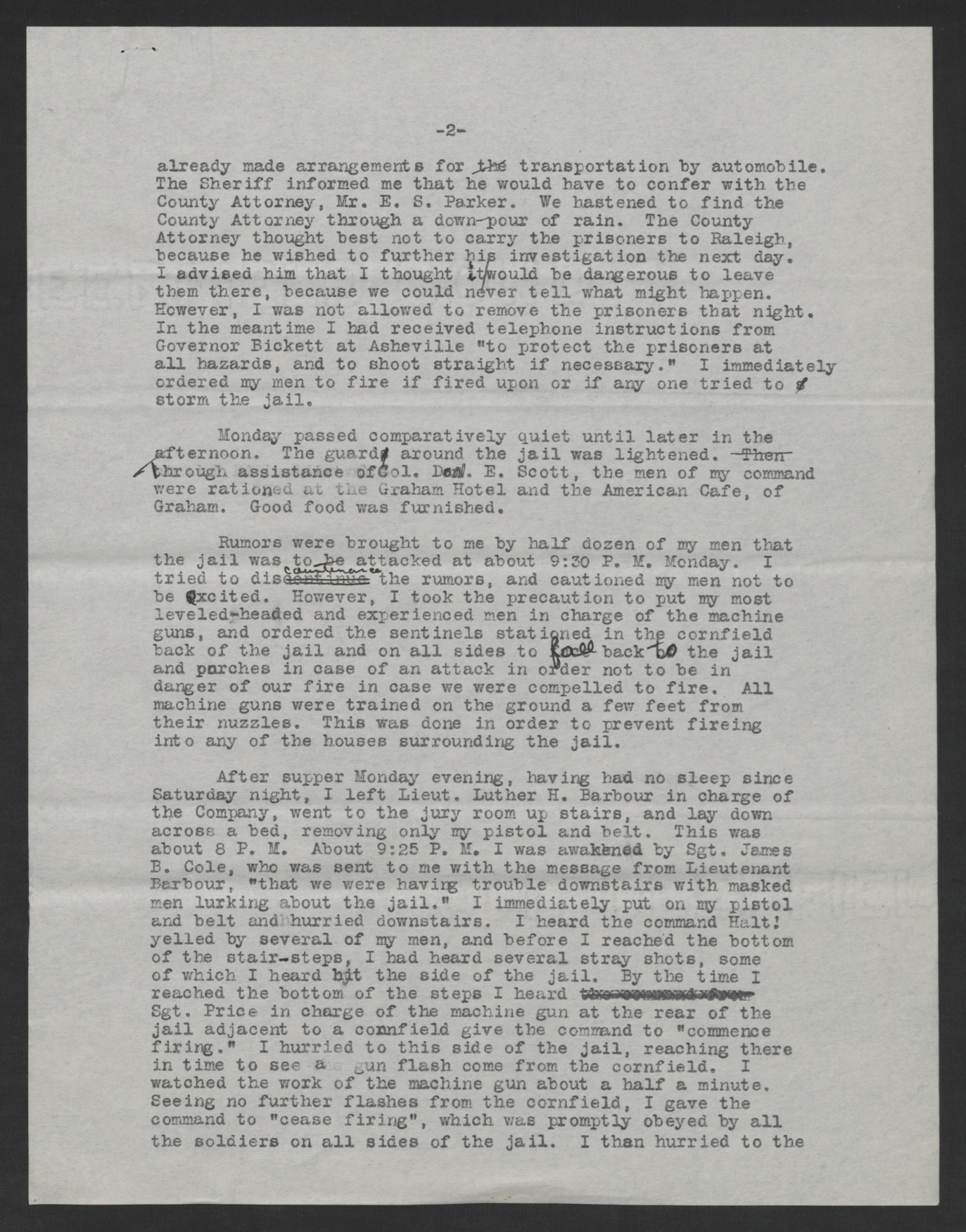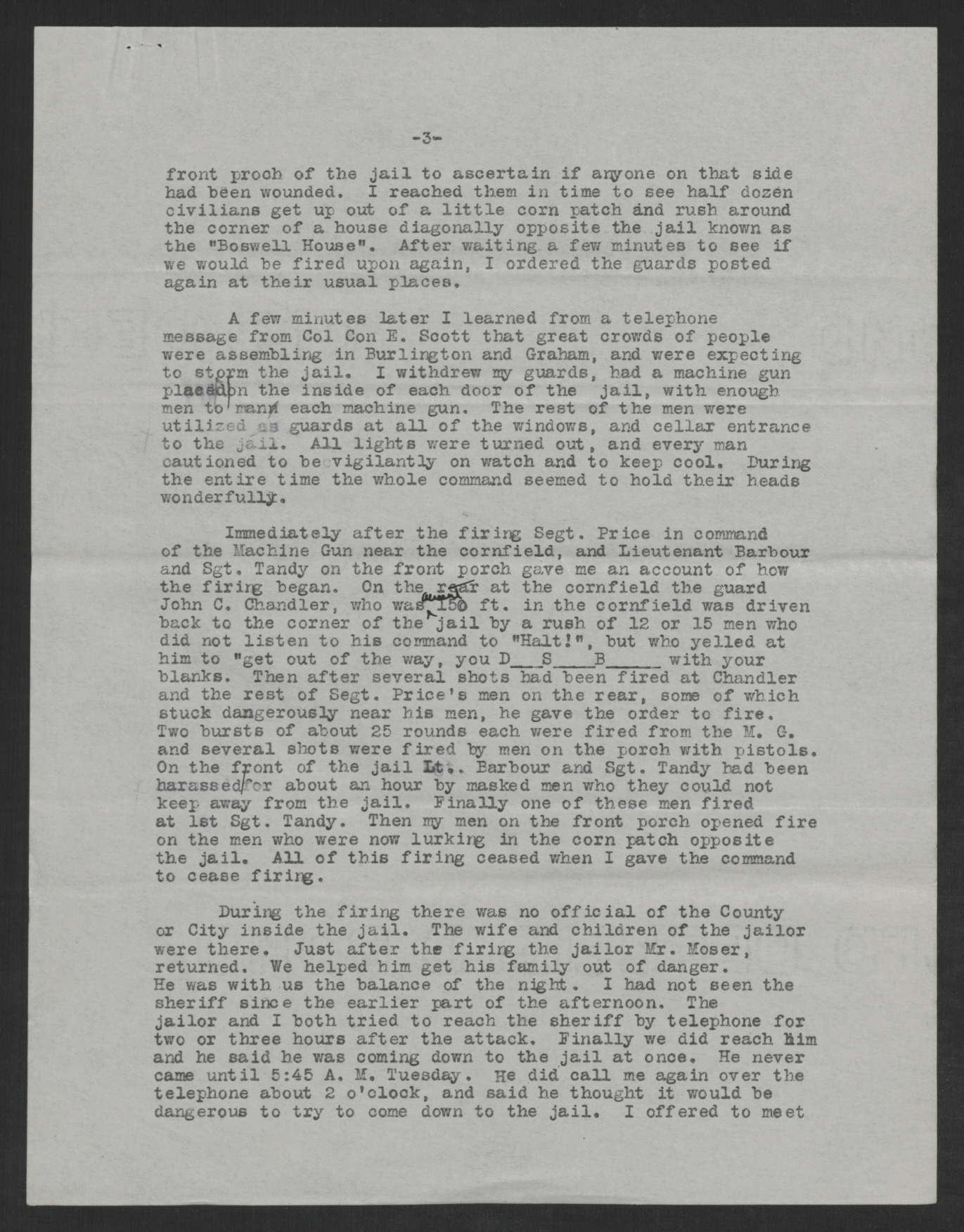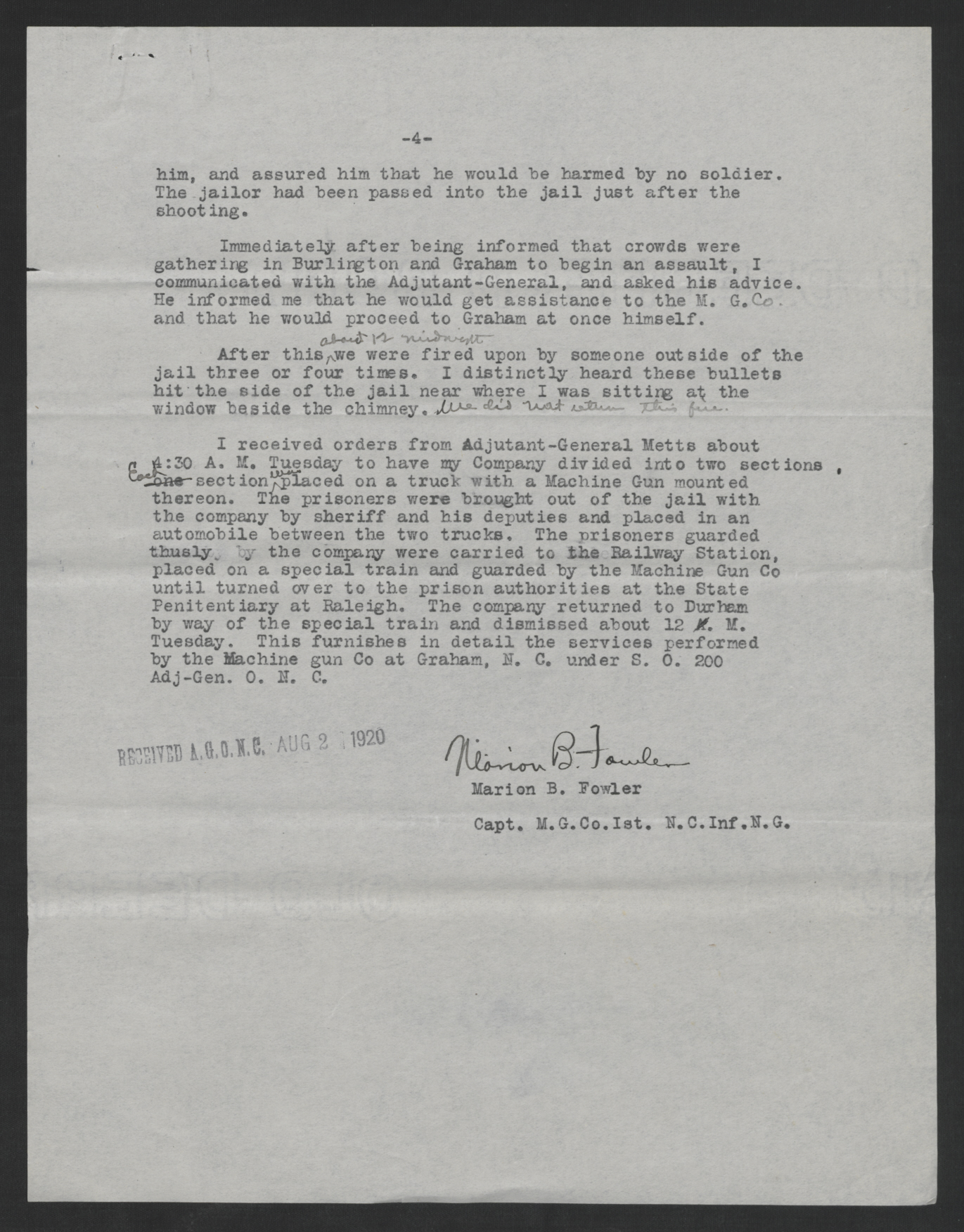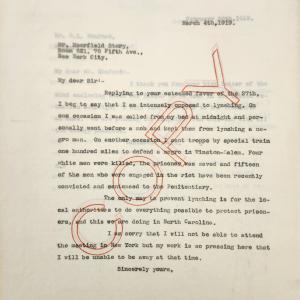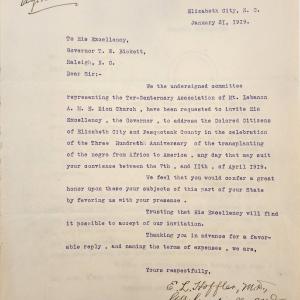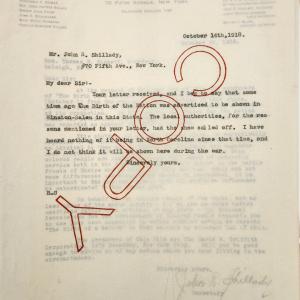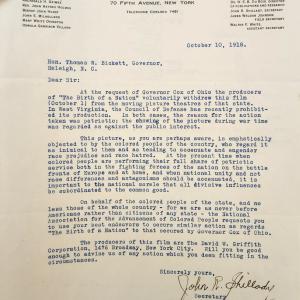Exibit "A"
MACHINE GUN COMPANY
1ST N. C. INFANTRY, N.G.
Durham, N.C.
July 29, 1920
From: Commanding Officer M.G. Co., 1st N.C. Inf. N.G.
To: Adjutant-General of North Carolina
Subject: Report of Services of M.G. Co. at Graham, N.C.
1. Pursuant to S.O. 200 Adjutant-General office, N.C.N.G., communicated to me over the telephone by Major Gordon Smith, Ass't. Adj. Gen. on Sunday, July 19, 1920 at about 2 P.M. I assembled 30 men and 1 officer of the M. G. Co, and left Durham at 4 P.M. by automobiles, arriving at Graham, N.C. at 6:30 P.M. In accordance with my instructions I reported to the Sheriff of Alamance County for duty and further instructions. After conferring with the sheriff and County Attorney, I at once threw a complete guard around the jail and jail yard for the purpose of protecting three prisoners held within the jail, who were being threatened by a mob of 1500 or 2000 people assembled on the porch, in the yard and on the streets about the jail. One Machine Gun was placed at each of the three entrances of the jail building, and guards placed along the streets to keep the crowds of the people off the jail lot. A cement sidewalk which surrounded the jail was established as a dead line beyond which no person was allowed except upon lawful duty. Regular releifs were establish and our tour of duty began. Orders were given the sentinels to talk to no one except upon lawful duty. During the rest of the afternoon our men suffered taunts, threats and vulgar remarks to be directed at them. Soon after our arrival a down-pour of rain served to disperse a few of the crowd assembled there. About 7:30 P.M. the man whom the jailer pointed out to me as the leader of the mob, by name Jim Carrigan, was called in the Jail for a conference with the Sheriff, the County Attorney and other prominent citizens of Graham. I was not invited to attend this conference and did not attend. Immediately after this conference a speech was made to the assembled people by a Mr. Long who promised the people if they would not attempt any rash act the prisoners "would be kept there in the county jail." Gradually the crowds began to disburse until at midnight there were very few people around the jail and the situation seemed quiet. Guards at the machine guns and sentries on the street were kept on duty all night. During the night other members of my company reported for duty, making a total of 37 men and officers with the Company.
About 2 A.M. Monday morning I aroused sheriff Storey from his bed and told him I thought it best to remove the prisoners to the State penitentiary at Raleigh. My 1st Sergeant had already made arrangements for transportation by automobile. The Sheriff informed me that he would have to confer with the County Attorney, Mr. E. S. Parker. We hastened to find the County Attorney through a down-pour of rain. The County Attorney thought best not to carry the prisoners to Raleigh, because he wished to further his investigation the next day. I advised him that I thought it would be dangerous to leave them there, because we could never tell what might happen. However, I was not allowed to remove the prisoners that night. In the meantime I had received telephone instructions from Governor Bickett at Asheville "to protect the prisoners at all hazards, and to shoot straight if necessary." I immediately ordered my men to fire if fired upon or if any one tried to storm the jail.
Monday passed comparatively quiet until later in the afternoon. The guard around the jail was lightened. Through assistance of Col. Don E. Scott, the men of my command were rationed at the Graham Hotel and the American Cafe, of Graham. Good food was furnished.
Rumors were brought to me by half dozen of my men that the jail was to be attacked at about 9:30 P.M. Monday. I tried to discountenance the rumors, and cautioned my men not to be excited. However, I took the precaution to put my most leveled-headed and experienced men in charge of the machine guns, and ordered the sentinels stationed in the cornfield back of the jail and on all sides to fall back to the jail and porches in case of an attack in order not to be in danger of our fire in case we were compelled to fire. All machine guns were trained on the ground a few feet from their nuzzles. This was done in order to prevent fireing into any of the houses surrounding the jail.
After supper Monday evening, having had no sleep since Saturday night, I left Lieut. Luther H. Barbour in charge of the Company, went to the jury room up stairs, and lay down across a bed, removing only my pistol and belt. This was about 8 P.M. About 9:25 P.M. I was awakened by Sgt. James B. Cole, who was sent to me with the message from Lieutenant Barbour, "that we were having trouble downstairs with masked men lurking about the jail." I immediately put on my pistol and belt and hurried downstairs. I heard the command Halt! yelled by several of my men, and before I reached the bottom of the stair-steps, I had heard several stray shots, some of which I heard hit the side of the jail. By the time I reached the bottom of the steps I heard Sgt. Price in charge of the machine gun at the rear of the jail adjacent to a cornfield give the command to "commence firing." I hurried to this side of the jail, reaching there in time to see a gun flash come from the cornfield. I watched the work of the machine gun about a half a minute. Seeing no further flashes from the cornfield, I have the command to "cease firing", which was promptly obeyed by all the soldiers on all sides of the jail. I then hurried to the front proch of the jail to ascertain if anyone on that side had been wounded. I reached them in time to see half dozen civilians get up out of a little corn patch and rush around the corner of a house diagonally opposite the jail known as the "Boswell House". After waiting a few minutes to see if we would be fired upon again, I ordered the guards posted again at their usual places.
A few minutes later I learned from a telephone message from Col Con E. Scott that great crowds of people were assembling in Burlington and Graham, and were expecting to storm the jail. I withdrew my guards, had a machine gun placed on the inside of each door of the jail, with enough men to man each machine gun. The rest of the men were utilized as guards at all of the windows, and cellar entrance to the jail. All lights were turned out, and every man cautioned to be vigilantly on watch and to keep cool. During the entire time the whole command seemed to hold their heads wonderfully.
Immediately after the firing Segt. Price in command of the Machine Gun near the cornfield, and Lieutenant Barbour and Sgt. Tandy on the front porch gave me an account of how the firing began. On the rear at the cornfield the guard John C. Chandler, who was about 150 ft. in the cornfield was driven back to the corner of the jail by a rush of 12 or 15 men who did not listen to his command to "Halt!", but who yelled at him to "get out of the way, you D___ S___ B_____ with your blanks. Then after several shots had been fired at Chandler and the rest of Segt. Price's men on the rear, some of which stuck dangerously near his men, he gave the order to fire. Two bursts of about 25 rounds each were fired from the M.G. and several shots were fired by men on the porch with pistols. On the front of the jail Lt. Barbour and Sgt. Tandy had been harassed for about an hour by masked men who they could not keep away from the jail. Finally one of these men fired at 1st Sgt. Tandy. Then my men on the front porch opened fire on the men who were now lurking in the corn patch opposite the jail. All of this firing ceased when I gave the command to cease firing.
During the firing there was no official of the County or City inside the jail. The wife and children of the jailor were there. Just after the firing the jailor Mr. Moser, returned. We helped him get his family out of danger. He was with us the balance of the night. I had not seen the sheriff since the earlier part of the afternoon. The jailor and I both tried to reach the sheriff by telephone for two or three hours after the attack. Finally we did reach him and he said he was coming down to the jail at once. He never came until 5:45 A.M. Tuesday. He did call me again over the telephone about 2 o'clock, and said he thought it would be dangerous to try to come down to the jail. I offered to meet him, and assured him that he would be harmed by no soldier. The jailor had been passed into the jail just after the shooting.
Immediately after being informed that crowds were gathering in Burlington and Graham to begin an assault, I communicated with the Adjutant-General, and asked his advice. He informed me that he would get assistance to the M. G. Co. and that he would proceed to Graham at once himself.
After this about 12 midnight we were fired upon by someone outside of the jail three or four times. I distinctly heard these bullets hit the side of the jail near where I was sitting at the window beside the chimney. We did not return this fire.
I received orders from Adjutant-General Metts about 4:30 A.M. Tuesday to have my Company divided into two sections. Each section was placed on a truck with a Machine Gun mounted thereon. The prisoners were brought out of the jail with the company by sheriff and his deputies and placed in an automobile between the two trucks. The prisoners guarded thusly by the company were carried to the Railway Station, placed on a special train and guarded by the Machine Gun Co until turned over to the prison authorities at the State Penitentiary at Raleigh. The company returned to Durham by way of the special train and dismissed about 12 A.M. Tuesday. This furnishes in detail the services performed by the Machine gun Co at Graham, N.C. under S.O. 200 Adj-Gen O.N.C.
Marion B. Fowler
Capt. M.G. Co. 1st. N.C. Inf. N.G.
[stamped] RECEIVED A.G.O.N.C. AUG 2 1920
Date:
Sender:
Recipient:
Related People:
Smith, Gordon
Storey, Charles Daniel
Parker, Edward Sanders
Lee, Will
Troxler, George
Vesie, Arthur Lee
Carrigan, James Edwin
Bickett, Thomas Walter
Scott, Donnell Everett
Barbour, Luther Howerton
Cole, James Baxter
Price, Robert McCollum
Tandy, George Wendell
Chandler, John Carlton
Moser, Adolphus Washington
Metts, John Van Bokkelen
Storey, Charles Daniel
Parker, Edward Sanders
Lee, Will
Troxler, George
Vesie, Arthur Lee
Carrigan, James Edwin
Bickett, Thomas Walter
Scott, Donnell Everett
Barbour, Luther Howerton
Cole, James Baxter
Price, Robert McCollum
Tandy, George Wendell
Chandler, John Carlton
Moser, Adolphus Washington
Metts, John Van Bokkelen

